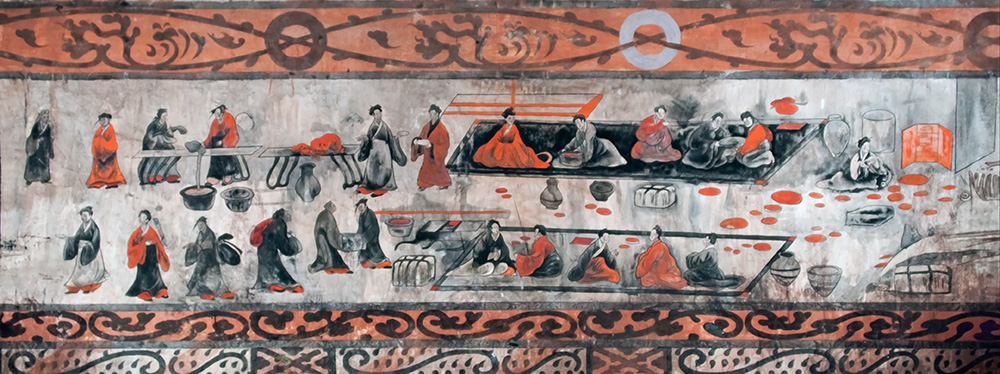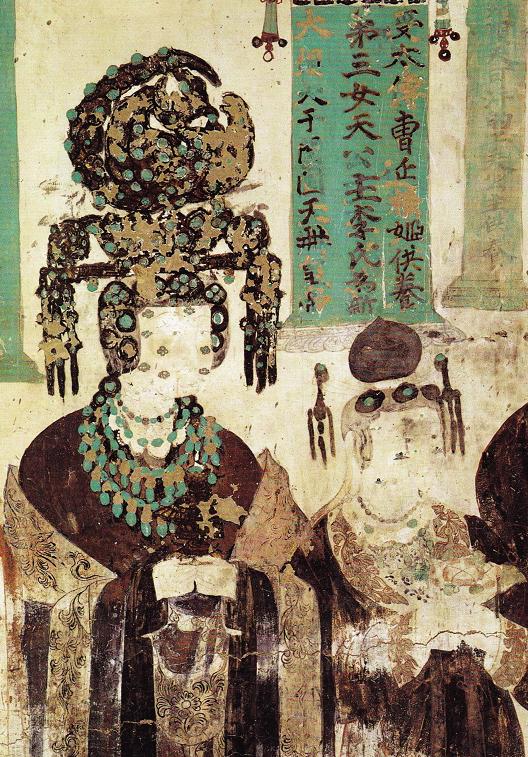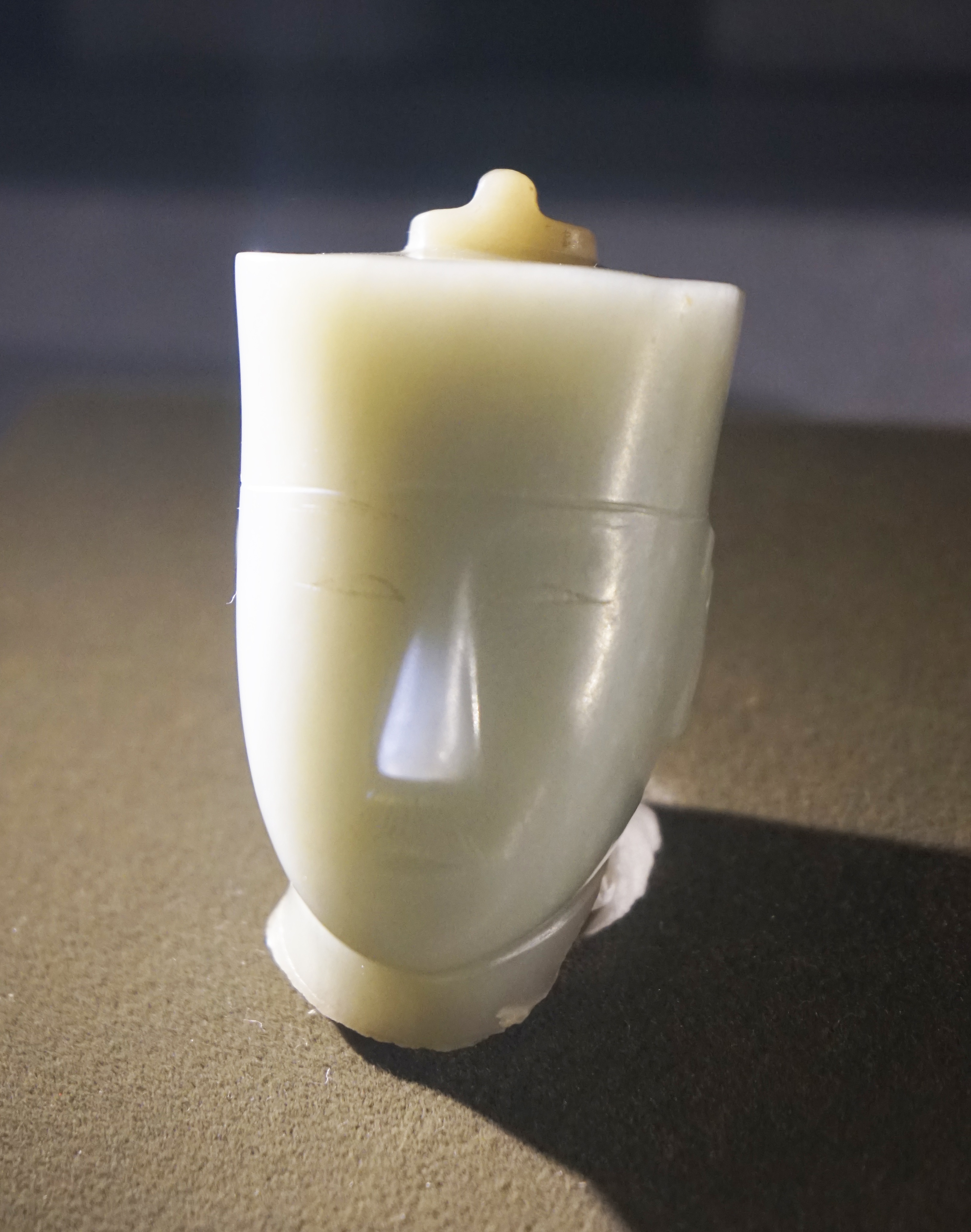|
Four Beauties
The Four Beauties or Four Great Beauties are four Chinese women who were renowned for their beauty. The four are usually identified as Xi Shi, Wang Zhaojun, Diaochan, and Yang Guifei. The scarcity of historical records concerning them meant that much of what is known of them today has been greatly embellished by legend. They all were said to have in some manner caught the attention of a ruling king or emperor in their respective eras. They gained their reputation from the influence they exercised over kings and emperors and, consequently, the way their actions impacted Chinese history. Three of the Four Beauties brought kingdoms to their knees and their lives ended in tragedy. Background One of the earliest references to qualities later associated with the canonical Four Great Beauties appears in the ''Zhuangzi''. In one chapter, the women Mao Qiang and Lady Li are described as "great beauties" who "when fish see them they dart into the depths, when birds see them they soar into ... [...More Info...] [...Related Items...] OR: [Wikipedia] [Google] [Baidu] |
Changzhou Combs
The Changzhou comb () is a type of hand-painted comb produced in Changzhou, Jiangsu, China. In China, combs are called shubi (梳篦). The combs were originally made for use by royalty and have been in production for over 2000 years. Introduction Comb is two kinds of utensils, namely wooden comb. Changzhou comb production technology was formed during the Eastern Jin dynasty and has a history of more than 1,500 years. During the Ming and Qing dynasties, the production process of Changzhou comb has reached a very high level, and the production scale has also exceeded the previous generations. The "Changzhou Fu" during the Qianlong period of the Qing dynasty stated: "Cut bamboo into, and all households in Chaojingmen." At that time, tens of thousands of people in Ximen and Nanmen of Changzhou were engaged in combing making, so Ximen had "Guiji Lane" , South Gate has "Mushu Street" as a place name. In the beginning of Guangxu period of the Qing dynasty, officials from the Suzhou W ... [...More Info...] [...Related Items...] OR: [Wikipedia] [Google] [Baidu] |
Fuchai
Fuchai (reigned 495–473BC), sometimes also written Fucha, was the last king of the state of Wu during the Spring and Autumn Period of Chinese history. His armies constructed important canals linking the Yellow, Ji, and Huai River systems of the North China Plain with central China's Yangtze River, but he is most remembered in Chinese culture for the role he played in the legends concerning Goujian, the revenge-seeking king of Yue. Life Fuchai was the son of King Helü. He became king in 495 BC, following the death of his father from injuries sustained during an invasion of Yue. In 494BC, Goujian, the king of Yue, heard rumours that Fuchai was planning to attack him in order to avenge the death of his father. Goujian's minister Fan Li advised caution, but Goujian decided on a pre-emptive strike. Fuchai in turn heard rumours of Goujian's plans and sent his army against Yue. The forces met at Fujiao where Wu won a complete victory, with only 5,000 Yue men surviving. These ... [...More Info...] [...Related Items...] OR: [Wikipedia] [Google] [Baidu] |
Dong Zhuo
Dong Zhuo () (died 22 May 192), courtesy name Zhongying, was a Chinese military general, politician, and warlord who lived in the late Eastern Han dynasty. At the end of the reign of the Eastern Han, Dong Zhuo was a general and powerful minister of the imperial government. Yet he forced the young Emperor Shao of Han to abdicate and replaced him with his half-brother Emperor Xian of Han while he sought to become the de facto ruler of China in the boy-emperor's name. The Eastern Han dynasty regime survived in name only. Dong Zhuo seized control of the imperial capital Luoyang in 189 when it entered a state of turmoil following the death of Emperor Ling of Han and a massacre of the eunuch faction by the court officials led by General-in-Chief He Jin. Dong Zhuo subsequently deposed Liu Bian (Emperor Shao) and replaced him with his half-brother, the puppet Emperor Xian of Han. Dong Zhuo's rule was brief and characterized by cruelty and tyranny. In the following year, a coalition o ... [...More Info...] [...Related Items...] OR: [Wikipedia] [Google] [Baidu] |
Lü Bu
Lü Bu () (died 7 February 199), courtesy name Fengxian, was a Chinese military general, politician, and warlord who lived during the late Eastern Han dynasty of Imperial China. Originally a subordinate of a minor warlord Ding Yuan, he betrayed and murdered Ding Yuan and defected to Dong Zhuo, the warlord who controlled the Han central government in the early 190s. In 192, he turned against Dong Zhuo and killed him after being instigated by Wang Yun and Shisun Rui, but was later defeated and driven away by Dong Zhuo's followers. From 192 to early 195, Lü Bu wandered around central and northern China, consecutively seeking shelter under warlords such as Yuan Shu, Yuan Shao and Zhang Yang. In 194, he managed to take control of Yan Province from the warlord Cao Cao with help from defectors from Cao's side, but Cao took back his territories within two years. In 195, Lü Bu turned against Liu Bei, who had offered him refuge in Xu Province, and seized control of the province f ... [...More Info...] [...Related Items...] OR: [Wikipedia] [Google] [Baidu] |
Three Kingdoms
The Three Kingdoms () from 220 to 280 AD was the tripartite division of China among the dynastic states of Cao Wei, Shu Han, and Eastern Wu. The Three Kingdoms period was preceded by the Han dynasty#Eastern Han, Eastern Han dynasty and was followed by the Jin dynasty (266–420), Western Jin dynasty. The short-lived state of Yan (Three Kingdoms), Yan on the Liaodong Peninsula, which lasted from 237 to 238, is sometimes considered as a "4th kingdom". Academically, the period of the Three Kingdoms refers to the period between the establishment of Cao Wei in 220 and the Conquest of Wu by Jin, conquest of the Eastern Wu by the Western Jin in 280. The earlier, "unofficial" part of the period, from 184 to 220, was marked by chaotic infighting between warlords in various parts of China during the end of the Han dynasty, downfall of the Eastern Han dynasty. The middle part of the period, from 220 to 263, was marked by a more militarily stable arrangement between three rival states ... [...More Info...] [...Related Items...] OR: [Wikipedia] [Google] [Baidu] |
Emperor Huan Of Han
Emperor Huan of Han (; 132 – 25 January 168) was the 27th emperor of the Han dynasty after he was enthroned by the Empress Dowager and her brother Liang Ji on 1 August 146. He was a great-grandson of Emperor Zhang. He was the 11th Emperor of the Eastern Han Dynasty. After Emperor Zhi was poisoned to death by the powerful official Liang Ji in 146, Liang Ji persuaded his sister, the regent Empress Dowager Liang to make the 14-year-old Liu Zhi, the Marquess of Liwu, who was betrothed to their sister Liang Nüying (), emperor. As the years went by, Emperor Huan, offended by Liang Ji's autocratic and violent nature, became determined to eliminate the Liang family with the help of eunuchs. Emperor Huan succeeded in removing Liang Ji in 159 but this only caused an increase in the influence of these eunuchs over all aspects of the government. Corruption during this period had reached a boiling point. In 166, university students rose up in protest against the government and calle ... [...More Info...] [...Related Items...] OR: [Wikipedia] [Google] [Baidu] |
Heqin
''Heqin'', also known as marriage alliance, refers to the historical practice of Chinese monarchs marrying princesses—usually members of minor branches of the ruling family—to rulers of neighboring states. It was often adopted as an appeasement strategy with an enemy state that was too powerful to defeat on the battlefield. The policy was not always effective. It implied an equal diplomatic status between the two monarchs. As a result, it was controversial and had many critics. Lou Jing (, later granted the imperial surname Liu 劉), the architect of the policy, proposed granting the eldest daughter of Emperor Gaozu of Han to the Modu Chanyu of the Xiongnu. His proposal was adopted and implemented with a treaty in 198BC, following the Battle of Baideng two years prior. Wang Zhaojun, of the Han dynasty, and Princess Wencheng, of the Tang dynasty, are among the most famous heqin princesses. The 20th-century scholar Wang Tonglin praised heqin for facilitating the "melting of ra ... [...More Info...] [...Related Items...] OR: [Wikipedia] [Google] [Baidu] |
Chang'an
Chang'an (; ) is the traditional name of Xi'an. The site had been settled since Neolithic times, during which the Yangshao culture was established in Banpo, in the city's suburbs. Furthermore, in the northern vicinity of modern Xi'an, Qin Shi Huang of the Qin dynasty, China's first emperor, held his imperial court, and constructed his massive mausoleum guarded by the Terracotta Army. From its capital at Xianyang, the Qin dynasty ruled a larger area than either of the preceding dynasties. The imperial city of Chang'an during the Han dynasty was located northwest of today's Xi'an. During the Tang dynasty, the area that came to be known as Chang'an included the area inside the Ming Xi'an fortification, plus some small areas to its east and west, and a substantial part of its southern suburbs. Thus, Tang Chang'an was eight times the size of the Ming Xi'an, which was reconstructed upon the site of the former imperial quarters of the Sui and Tang city. During its heyday, Chang'an w ... [...More Info...] [...Related Items...] OR: [Wikipedia] [Google] [Baidu] |
Huhanye
Huhanye (), born Jihoushan (), was a Chanyu of the Xiongnu Empire, the son of Xulüquanqu Chanyu. He rebelled in 59 BC with the aid of Wushanmu and Woyanqudi Chanyu soon committed suicide, leaving the Xiongnu torn apart by factional strife. By 55 BC, only Huhanye and his brother Zhizhi Chanyu were left. Family Parents: *Father: Xulüquanqu Chanyu *Mother: Unknown *Brother: Woyanqudi Chanyu Wives *Lady Da Yanzhi (大阏氏) ** Fuzhulei Ruodi Chanyu (复株絫若鞮单于; r 31–20 BC) **Souxie Chanyu (搜谐单于; r. 20–12 BC) ** Wulei Chanyu (乌累若鞮单于; r.13–18 AD) **Prince Xian of Zuo (左贤王) *Lady Zhuanqu Yanzhi (颛渠阏氏) **Juya Chanyu (车牙单于; r.12–8 B.C) ** Wuzhuliu Chanyu (乌珠留单; r.8 BC–13 AD) *Lady Tuqi Yanzhi (屠耆阏氏) **Prince Xian of You (右贤王) *Lady Diwu Yanzhi (第五阏氏) **Huduershidaogao Chanyu (呼都而尸道皋若鞮单于) *Lady Wang Zhaojun (王昭君) **Prince Yituzhiyashi (伊屠智牙師) ** Another Prin ... [...More Info...] [...Related Items...] OR: [Wikipedia] [Google] [Baidu] |
Chanyu
Chanyu () or Shanyu (), short for Chengli Gutu Chanyu (), was the title used by the supreme rulers of Inner Asian nomads for eight centuries until superseded by the title "''Khagan''" in 402 CE. The title was most famously used by the ruling Luandi clan of the Xiongnu during the Qin dynasty (221–206 BCE) and Han dynasty (206 BCE–220 CE). It was later also used infrequently by the Chinese as a reference to Gokturk leaders. Etymology According to the ''Book of Han'', "the Xiongnu called the Tian, Heaven (天) ''Tengri, Chēnglí'' (撐犁) and they called a child (子) ''gūtú'' (孤塗). As for ''Chányú'' (單于), it is a "vast [and] great appearance" (廣大之貌).". L. Rogers and Edwin G. Pulleyblank argue that the title ''chanyu'' may be equivalent to the later attested title ''tarkhan'', suggesting that the Chinese pronunciation was originally ''dān-ĥwāĥ'', an approximation for ''*darxan''.Universität Bonn. Seminar für Sprach- und Kulturwissenschaft Zentra ... [...More Info...] [...Related Items...] OR: [Wikipedia] [Google] [Baidu] |
Xiongnu
The Xiongnu (, ) were a tribal confederation of nomadic peoples who, according to ancient Chinese sources, inhabited the eastern Eurasian Steppe from the 3rd century BC to the late 1st century AD. Modu Chanyu, the supreme leader after 209 BC, founded the Xiongnu Empire. After their previous rivals, the Yuezhi, migrated west into Central Asia during the 2nd century BC, the Xiongnu became a dominant power on the steppes of East Asia, centred on the Mongolian Plateau. The Xiongnu were also active in areas now part of Siberia, Inner Mongolia, Gansu and Xinjiang. Their relations with adjacent Chinese dynasties to the south-east were complex—alternating between various periods of peace, war, and subjugation. Ultimately, the Xiongnu were defeated by the Han dynasty in a centuries-long conflict, which led to the confederation splitting in two, and forcible resettlement of large numbers of Xiongnu within Han borders. During the Sixteen Kingdoms era, as one of the "Five B ... [...More Info...] [...Related Items...] OR: [Wikipedia] [Google] [Baidu] |
Emperor Yuan Of Han
Emperor Yuan of Han (Liu Shi 劉奭; 75 BC – 8 July 33 BC) was an emperor of the Chinese Han dynasty. He reigned from 48 BC to 33 BC. Emperor Yuan promoted Confucianism as the official creed of the Chinese government. He appointed Confucius adherents to important government posts. However, at the same time that he was solidifying Confucianism's position as the official ideology, the empire's condition slowly deteriorated due to his indecisiveness, his inability to stop factional infighting between officials in his administration, and the trust he held in certain corrupt officials. Family background When Emperor Yuan was born as Liu Shi in 75 BC, his parents Liu Bingyi and Xu Pingjun were commoners without titles. Bingyi was the great-grandson of Emperor Wu, and his grandfather Liu Ju was Emperor Wu's crown prince, until he was forced by Emperor Wu's paranoia into a failed rebellion in 91 BC while Bingyi was still just an infant. The aftermath of the failed rebellion ... [...More Info...] [...Related Items...] OR: [Wikipedia] [Google] [Baidu] |










